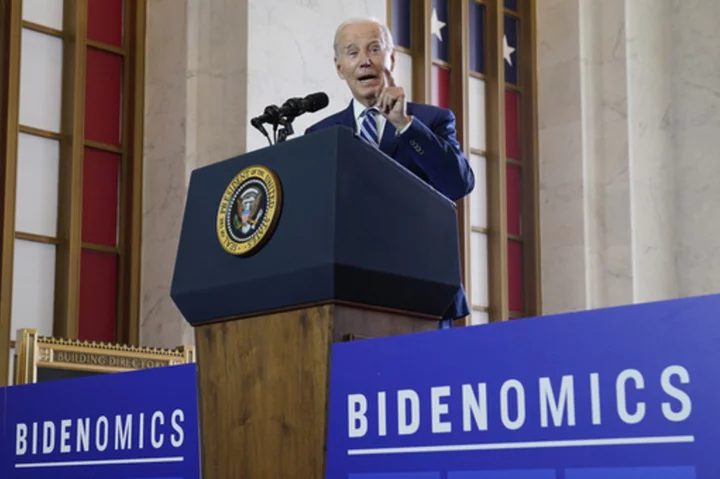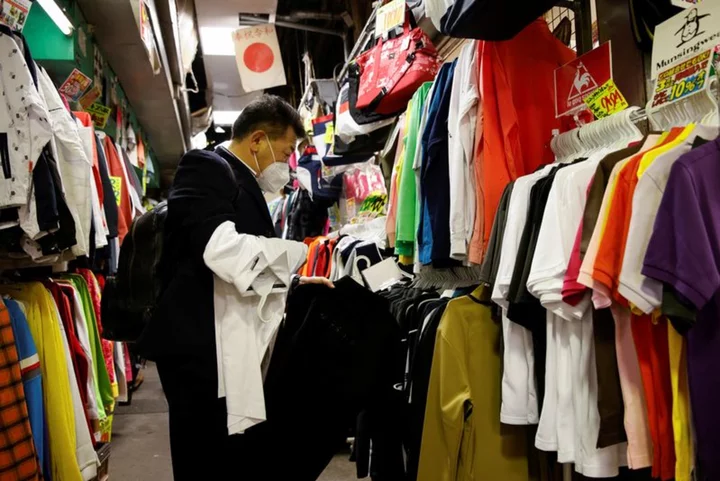By Francesco Canepa and Balazs Koranyi
FRANKFURT (Reuters) -The European Central Bank risks losing sight of corporate profits as a driver of inflation - or "greedflation" in market parlance - by zeroing in on wage growth which still lags far behind prices, economists said on Friday.
ECB President Christine Lagarde singled out rising salaries as a prime cause for high growth in prices at her news conference on Thursday as she signalled at least one more interest rate increase by the euro zone's central bank.
The renewed focus on the labour market - on which policymakers "spent a lot of time" at their two-day meeting, Lagarde said - marked a pivot back for the ECB, which had been giving more prominence to the issue of high corporate margins in recent communication.
It also rang alarm bells for economists worried that the ECB was calling for workers to continue to bear the cost of higher prices while downplaying the fact that companies were making bumper profits thanks to a lack of vigorous competition.
"The ECB, despite hopes to the contrary, really does not want to talk about profits and continues to blame workers for inflation (and) ask workers to continue to take the distributional pain," Daniela Gabor, a professor of economics and macro-finance at the University of West England in Bristol, said on Twitter.
Unit labour costs - the ratio of employee compensation to labour productivity - rose by less than prices in the first quarter of this year, Eurostat data showed. This continued a trend seen 2022 when wages rises trailed far behind inflation, slashing people's spending power.
Official data on profits is harder to find but Refinitiv data shows euro zone companies that sell to consumers reported a 10.1% operating margin in the first quarter, in line with last year and up by nearly a fifth from before the pandemic.
Lagarde did mention that some firms were making "relatively" high profits "especially where demand has outstripped supply".
But she mostly blamed "an issue of unit labour cost – in other words, productivity" for keeping inflation high despite stagnant economic growth.
Eric Dor, a professor at the IESEG School of Management in Paris, saw a paradox in the ECB's policy: higher rates were decreasing demand and, in turn, production.
As firms were not immediately laying off workers, Dor argued this decrease in production resulted in lower productivity per employee and therefore higher costs and, ultimately, prices.
"Thus a policy, aiming at reducing inflation, is contributing to its persistence, at least in the short term," Dor said.
ABSORBING COSTS
The ECB assumed in its forecasts that corporate profits will stop contributing to inflation next year, meaning companies will start absorbing higher labour costs.
This would mark a remarkable turnaround after two years in which profits were a driving force of higher prices.
"Such a scenario is possible, but others are possible as well," IESEG's Dor said. "For example, if in several sectors competition is sufficiently imperfect to allow firms to have a big market power, they could choose, even in a recession, to compensate the decline in the volume of sales by an increase in the selling prices, to maintain their global profits."
Lagarde did not delve into why profits were high or say whether they deserved the attention of central bankers or other policymakers, leaving it to employers and workers to fight it out.
"It's going to be for the parties around the table to actually determine what they do going forward in terms of allocating profits and organising these social relationships," Lagarde said.
Instead, she said the ECB would focus on bringing inflation back to its 2% target, likely starting with another rate hike in July.
But Rene Repasi, a member of the European Parliament committee that oversees the ECB, said such 'greedflation' should not be tackled by higher rates but by going after cartels in products that affect the poorer parts of society.
"We are asking the (EU) Commission to enforce the competition law in a more targeted way, shifting attention from 'any consumer' to 'vulnerable consumers'," the German social democrat politician said.
(Reporting By Francesco Canepa; Editing by Toby Chopra)









